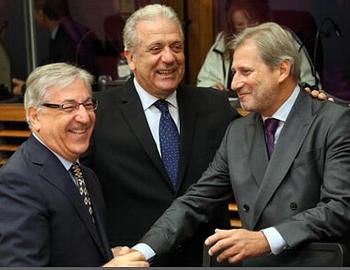
BRUSSELS, Belgium, October 23, 2016 (ENS) – At the first Eastern Partnership formal ministerial meeting on environment and climate change, the EU and six partner countries to the east confirmed their joint commitment to cooperation on environmental challenges, climate change and sustainable development.
The Eastern Partnership is a framework of cooperation between the EU, including its 28 Member States, and the six countries of the Eastern Neighbourhood – Armenia, Azerbaijan, Belarus, Georgia, Republic of Moldova and Ukraine.
On October 18 in Luxembourg, EU Commissioners Karmenu Vella and Johannes Hahn joined ministers and senior officials for environment and climate change from EU Member States and Eastern Partner countries in adopting a Ministerial Declaration that outlines pathways to cooperation on environmental governance and a green economy.

Participants at the Luxembourg meeting stressed the need to shift towards the sustainable and integrated management of natural resources and sustainable consumption and production in line with circular economy principles.
They highlighted the opportunities that environmental protection offers to the private sector and industry to stimulate economic growth.
Vella, who serves as European Commissioner for Environment, Fisheries and Maritime Affairs, said, “Given the proximity of the European Union and the Eastern Partner countries, as well as the trans-boundary nature of environmental and climate challenges, cooperation between us is imperative.”
“Today we agreed on the need to cooperate in key areas which have a positive impact on citizens’ lives and health,” Vella said, “reducing air and water pollution, for example, and creating new jobs through a shift to a green economy.”
“This also means addressing international challenges together,” he said, “including the implementation pf the 2030 Agenda for Sustainable Development and the Paris Agreement on Climate Change.”
The Declaration stresses, “That environmental and climate challenges are transboundary interdependent by nature, and therefore require a holistic approach to address them. Given the geographic proximity of the EU and EaP countries and their shared environmental assets, strengthened transboundary cooperation and joint action on air, forests, land and soil, nature and biodiversity and water resources, including seas, are needed…”
Commissioner Hahn, who is responsible for European Neighbourhood Policy and Enlargement Negotiations, said, “Environmental protection and climate action is not only our duty, it is a good investment that will result in new jobs, higher revenues, and a more resilient economy.”

Small and medium-sized enterprises, SMEs, will benefit from the newly affirmed cooperation, participants said.
“Thanks to EU support, SMEs across the Eastern Partnership region are being made aware of green economy opportunities and are starting to utilise them,” said Commissioner Hahn. “The EU will continue to support Eastern Partnership countries in their efforts to build a resource and energy-efficient economy, to the benefit of all our citizens.”
During the afternoon session on Climate Action, Ministers looked at how to bring forward implementation of the Paris Agreement on Climate Change.
Discussions focused on the question of how Eastern Partner countries can develop low-emission and climate-resilient economies, in part by exploiting the potential for energy savings in the region.
The EU and its neighbors share common challenges, such as transboundary pollution and loss of biodiversity in shared regional seas and shared rivers. The European Commission states, “…addressing these challenges requires everybody’s involvement and concerted action.”
Our EU Member States will not meet commitments under EU legislation if we do not engage the action of our neighbours,” the Commission says.
By promoting environmental cooperation, the Commission says the EU improves the quality of life of citizens by providing improved basic services, modernization of industries and investments.
The ministers agreed to meet in two years to assess progress on cooperation between the EU and Eastern Partner countries on these issues.
In the meantime, they tasked the Eastern Partnership Panel on Environment and Climate Change to draft and implement an action plan that will translate the provisions of the Declaration into practice.
The Ministerial meeting on Environment and Climate Change is co-organized by the European Commission and the Slovak Presidency of the Council of the European Union.
The main body to steer the Ministerial process and follow up on the commitments of the Declaration will be the existing Eastern Partnership Panel on Environment and Climate Change.
The Panel brings together the European Commission, EU member states and Eastern Partner country experts, as well as civil society organizations, to discuss the progress on environment and climate change, share best practices and facilitate cooperation and coordination on regional programs.
After the adoption in 2015 through the United Nations of the 2030 agenda on sustainable development and the successful adoption of the Paris Agreement on Climate Change, which takes effect November 4, environment and climate change issues lie at the heart of the implementation by the EU of a renewed and universal sustainable development agenda.
The Commission says the European Union is committed to supporting the shift to better environmental governance, low-emission development and a greener economy in the Eastern Partner countries.
Support of environment and climate change for Eastern Partner countries is of strategic importance for the EU to achieve objectives inside the EU and to improve the quality of life of the citizens in partner countries.
The EU-funded regional projects such as Shared Environmental Information Systems East, Greening Economies in Eastern Neighbourhood, and Clima East: Supporting Climate Change Mitigation and Adaptation in Eastern Neighbourhood countries and Russia, are supporting these efforts.
Copyright Environment News Service (ENS) 2016. All rights reserved.
© 2016, Environment News Service. All rights reserved. Content may be quoted only with proper attribution and a direct link to the original article. Full reproduction is prohibited.
